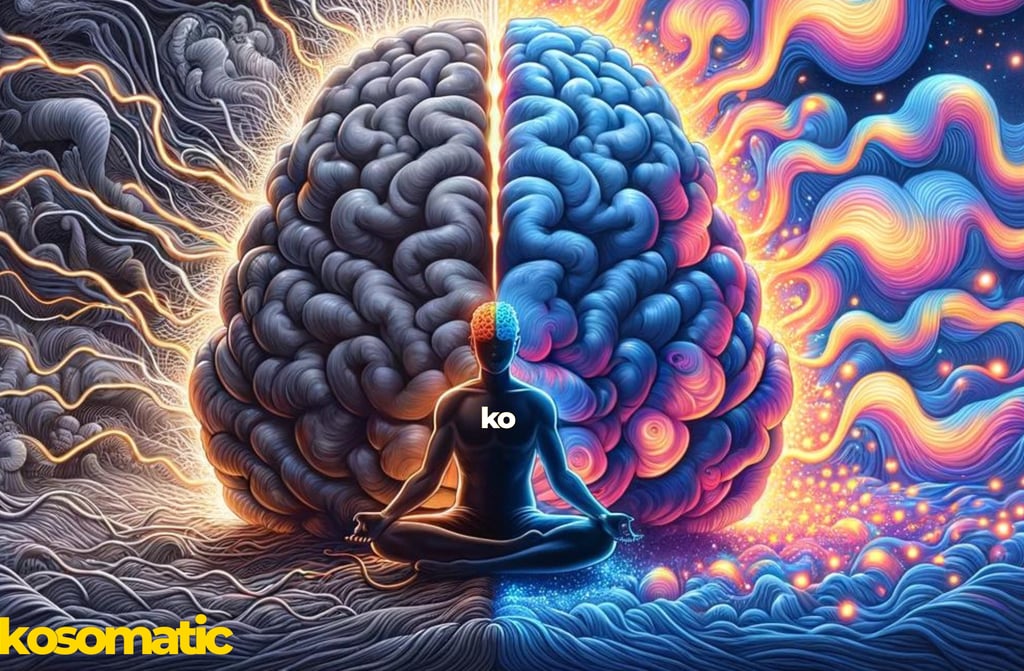Grey Matter Gains
Reshape Your Brain to Get Your Mind Back Onside
BREATHWORKMEDITATIONMINDFULNESSMUSIC THERAPY


In an era where global disillusionment seems to be at an all-time high, turning inward for answers and healing has become more essential than ever. You too can discover your inner resilience and figure out the seemingly unfathomable.
Through various types of meditation, I've personally experienced improved mood, reduced stress, and enhanced focus. But why is this the case? Similar to how physical exercise reshapes your body, engaging in meditation and mindfulness practices transforms your brain. This process, known as neuroplasticity, fosters new connections between brain cells and increases grey matter in the prefrontal cortex — the area responsible for complex thinking. This results in deeper concentration, sustained focus, and an improved ability to resist distractions. In contrast, frequent alcohol consumption or recreational drug use can impair these brain functions, leading to increased stress and negative emotions. Ironically, that "stress-relieving" pint of beer or glass of wine is likely to heighten your stress levels over time.
During the peak of my burnout, I found myself unable to concentrate on even a single sentence without my thoughts drifting away. The transformation I've experienced since then — entirely through natural means —has been nothing short of remarkable. I'm eager to share how holistic practices, particularly meditation, breathwork meditation, music therapy, and mindfulness, positively impact the brain's structure and functionality, especially in areas linked to stress, anxiety, and depression.
Ride the Waves
The brain, the most compex of all our organs, is at the core of our emotional, memory, and decision-making processes. It includes the Default Mode Network (DMN), amygdala, hippocampus, and prefrontal cortex. The DMN, often referred to as the "monkey mind," is active during periods of mind-wandering and self-reflection. The amygdala handles our emotional responses, including fear and anxiety. The hippocampus serves as our memory center, and the prefrontal cortex, the executive part of the brain, oversees our choices and social interactions.
Accompanying these structures are various brainwaves: delta, theta, alpha, beta, and gamma. Each represents a distinct state of consciousness, ranging from deep sleep to intense concentration, and plays a vital role in shaping our perception and interaction with the world.
Meditation not Medication
Reconnecting with ourselves and the world we live in is a journey best done naturally. Of course medication has its place, but it often seems to be the first port of call, when other natural and effective remedies exist. Meditation fine-tunes our brain's orchestra, ensuring harmony and reducing the incessant chatter of the DMN. It diminishes the amygdala's influence, thereby reducing our emotional reactivity to stress, while simultaneously strengthening the hippocampus to enhance memory and learning. Essentially, regular meditation can make you smarter!
Breathwork meditation like SOMA Breath, which utilises rhythmic breathing and music technology, can significantly increase alpha and theta brainwaves, inducing a state of calm alertness and creativity. This counters the beta waves commonly associated with anxiety and stress, promoting a balanced mental state.
Music Therapy
Music therapy can act as a soothing agent for the mind. It has a direct effect on the amygdala, alleviating anxiety and depression while boosting the release of positive neurotransmitters such as dopamine and serotonin. The rhythm and melody of music can align with our brainwaves, inducing states of relaxation and mental clarity similar to those achieved through deep meditation.
Mindfulness
Mindfulness involves being fully present and engaged in the moment without distraction or judgment. This practice strengthens the prefrontal cortex, improving our ability to manage stress and regulate emotions. Mindfulness can dismantle the patterns of rumination that are often present in depression and anxiety, leading to improved mental well-being.
Align Your Inner & Outer Worlds
The practices of meditation, breathwork, music therapy, and mindfulness serve as portals to understanding and harmonising our inner selves with the lives we lead. They equip us with the means to navigate the complexities of stress, anxiety, and depression by tapping into the brain's inherent potential and resilience.
Incorporating these practices into our daily lives doesn't require drastic changes but rather small, consistent steps toward mindfulness and self-care. Simply getting yourself out of bed 20 minutes earlier to engage in meditation can be transformative, helping you discover the peace and clarity you seek. I've embraced this path, and you can too.
We all have the inherent ability to heal and find inner wisdom. Get in touch if you'd like to explore these techniques further.
